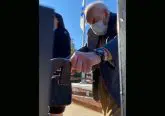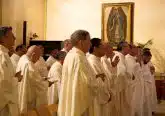Denver Archdiocese defends gender identity policy for schools
St. Louis, Mo., Nov 11, 2022 / 16:00 pm
The Archdiocese of Denver is defending its guidance on sexual identity in Catholic schools after an article on the policy was published earlier this week in a local newspaper.
A Nov. 7 Denver Post story shared and criticized the policy — which has been in place since 2019 — highlighting a section advising against the enrollment of students who reject their biological sex, especially if their parents are supportive of the student’s transition.
“Ministry to students who experience same-sex attraction or gender confusion or are diagnosed with gender dysphoria, or to their families, should be carried out with charity and prudence, affirm God’s unconditional love for the person, be faithful to Church teachings, show compassion, and help students integrate their self-understanding with the truth,” the 2019 document reads.
The archdiocese said in a statement to CNA that the document “was shared with administrators in 2019 to help clarify the Church’s teachings regarding gender issues in our Catholic schools. If questions come up in a school, each case will be addressed individually with the utmost care and concern for all involved.”
“We don’t expect everyone to ascribe to a Catholic worldview, but we strongly reject attempts to paint our position as bigoted or unloving,” the diocesan statement reads.
“It is precisely because of our love and reverence for the nature of the human person that we cannot stay quiet on this matter and must address what Pope Francis has said is the ‘ideological colonization’ taking place in our world today.”
The 2019 policy, which remains in use today, reads:
“By enrolling a student who openly rejects his or her given sexual identity and seeks to be affirmed in his or her desired identity by peers and the school community, the school compromises its mission and identity in multiple ways.”
“The school’s decision is likely to be construed as endorsing the view that a person can be ‘born in the wrong body’ or can ‘change gender’ or sex — a view that contradicts Catholic teaching and is simply not true; by validating the student’s erroneous belief about him or herself, the school effectively lies to the student and hinders the student’s search for the truth; by accepting the student’s presentation of him or herself as ‘transgender’ or any other identity at odds with the student’s biological sex, the school is likely to confuse other students, staff, and families about the truth of the human person and the dangers of gender idcology, and to give scandal to the community at large,” the policy reads.
However, a student struggling to accept his or her sexual identity — but who does not reject his or her sexual identity or assert a new one — could be enrolled, the policy says, as long as there is an “expectation that the parents and child will work towards an integrated sexual identity (aligned with bodily reality).”
The Denver policy is based on the work of the Person and Identity Project, which was founded in 2019 by Theresa Farnan and Susan Selner-Wright, both Ph.D. philosophy professors, and Mary Rice Hasson, an attorney and public policy expert who is a fellow at the Ethics and Public Policy Center, which sponsors the project.
Selner-Wright told CNA in a 2019 interview that “because we have a tradition of welcome and openness, there are a lot of other people who are not Catholic using our Catholic schools, and that’s great.”
“But people have to remember that the purpose of Catholic schools is to assist Catholic parents, who are the primary teachers of their children, in executing the parents’ duties.”
Their recommendations are not “one size fits all,” and there are some situations in which a child could be admitted, Selner-Wright emphasized.
For example, there could be a situation in which a single parent who experiences same-sex attraction but is trying to live a chaste life wants to enroll a child in a Catholic school. The attraction itself isn’t the issue, Selner-Wright said, as long as the parent is not living in a way that generates a contradiction between what the child learns in school and what they learn at home.
Selner-Wright said the goal of their project is to inform people about gender ideology and equip them with the knowledge to refute it in a compassionate, loving manner. She said Catholics who accept the Church’s teaching on gender are sometimes dismissed as “hateful” toward those who accept gender ideology, but she said loving a person who is questioning his or her gender cannot involve a wholesale affirmation of that person’s desires or choices.
The only way to rightly love a person is in the context of the truth, she said — therefore, questioning a person’s decision to “transition” can be a loving decision, born out of a desire for what is best for the person.
CNA contacted Selner-Wright this week for additional comment but did not hear back before publication.
The policy also includes recommendations that Catholic educators should not use a student’s “preferred pronouns” but instead the pronouns that fit with the student’s biological sex. In addition, the policy reads, “in no situation should the school recognize, encourage, endorse, or facilitate a student’s ‘gender transition.’” In addition, students must use the bathroom that fits with their biological sex and may not attend school functions such as dances as a same-sex couple.
Denver is one of several U.S. dioceses in recent years to issue guidance related to gender theory following the Congregation for Catholic Education’s 2019 document “Male and Female He Created Them,” which says that the Church teaches an essential difference between men and women, ordered in the natural law and essential to the family and human flourishing.
Several other dioceses throughout the country, including Green Bay, Wisconsin; Milwaukee; and Sioux Falls, South Dakota, have implemented similar policies to Denver’s on gender dysphoria.
The Milwaukee document cites Pope Francis writing in Laudato si’: “Learning to accept our body, to care for it, and to respect its fullest meaning, is an essential element of any genuine human ecology … It is not a healthy attitude which would seek ‘to cancel out sexual difference because it no longer knows how to confront it.’”
Bishop Thomas Paprocki of Springfield, Illinois, issued a pastoral guide regarding diocesan policies on gender identity in early 2020. He said that Catholics must support those struggling with gender dysphoria with “compassion,” but this does not mean compromising Catholic values.
The Omaha Archdiocese, in response to feedback from parents and educators, announced in September that it would delay the implementation of a new policy for Catholic schools on gender identity and gender dysphoria and will promulgate a new policy for the 2023–2024 school year.
Under the Aug. 25 policy — which was to take effect Jan. 1, 2023 — all students, parents, guardians, employees, and volunteers would have been required to “act toward a person in accordance with his or her biological sex at birth.” A spokesman for the archdiocese reiterated that the new policy would continue to affirm the Church’s teachings on gender, even after revisions.
Note: The description of the roles of Farnan, Selner-Wright, and Hasson has been revised since publication.













